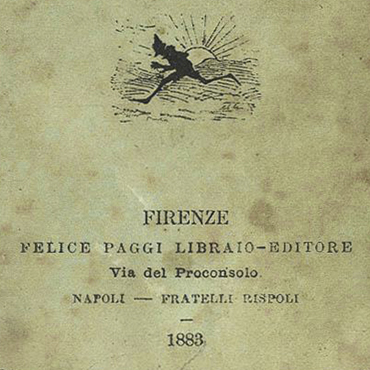Felice Paggi was born in Siena in 1822. His father was Mordekai, a doctor and rabbi manqué, a famous teacher of young Jews, known in Florence as Angelo; his mother was Benvenuta Bemporad. He joined his brother Alessandro (1818-1893) – the founder of a printing and publishing house that at first specialised in university medical manuals – as administrator and later director. As a result of his management, the family press came to be considered one of the soundest and most reliable publishing businesses in Florence. In 1842 he started dealing with the Tipografia Elvetica of Capolago (a district of Mendrisio) which was exporting covertly from the Canton Ticino patriotic writings of the Italian Risorgimento, writings that were then distributed in secret by Italian booksellers.
The Paggi bookshop, which in its new permanent home in Via del Proconsolo in Florence, was known the police, in part on account of a number of clandestine publications, was the target of several searches from the end of 1846, but nevertheless it managed to be a lively and vibrant centre for spreading the cultural development of the Italian Risorgimento. In 1851 the first volume in the series “Biblioteca italiana” started an ambitious project, only partially s
uccessful, that, beginning with contemporary authors, aimed at producing a new, faithful edition of the works of Giambattista Vico. This plan was never achieved.
Having provided within the bookshop a meeting place for the more open-minded liberal circles, Felice Paggi set himself the objective, even before unification, of “making the Italians”. This led in 1857 to the birth of the “Biblioteca scolastica”, a collection of texts for use at every level of school (often accompanied by lexical notes, edited by Paggi himself, which were meant to help readers outside Tuscany to overcome any difficulties). This series was to promote, besides the content, an elegant and correct language. The list of various contributors of note of the time, from Pietro Thouar to Gino Capponi, from Pietro Dazzi to Ida Baccini, from Augusto Alfani to Ferdinando Martini or to a young Ermenegildo Pistelli, included also Raffaello Caverni, who in 1888 published in Paggi’s series Con gli occhi per terra: nozioni intorno alla natura e alle proprietà di alcune sostanze minerali.
However, the talented writer whose discovery gave resonance to the name of the Paggi brothers was Carlo Collodi, who, having started with a translation into Italian of the Racconti delle fate by Perrault, then reading books for children and adults (such as Giannettino or Occhi e nasi) and very much appreciated schoolbooks, in 1883 produced a volume with the collection of the Avventure di Pinocchio that had already appeared in instalments in the “Giornale per i bambini”. In 1889 the Paggi brothers sold the bookshop and publishing business to Roberto Bemporad, Alessandro’s son-in-law, and to his son Enrico, who, on the death of his father in 1890, became the sole director. Felice Paggi died in Florence in 1895.

